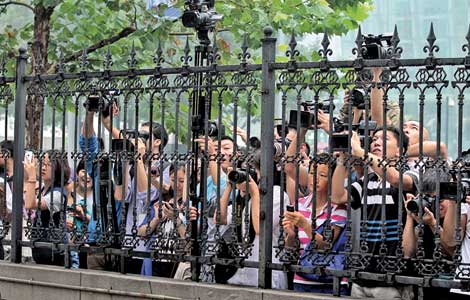Crime and punishment for corrupt officials
Updated: 2013-08-29 08:14
By Ji Zhebu in Beijing (China Daily)
|
||||||||
Stock phrases
Some commentators have complained that they hear the same stock phrases whenever corrupt officials are sentenced, saying that the usual line is this: Although Official X is guilty of embezzlement or accepting bribes, thereby causing great damage to society, he has admitted his crime and returned the money, and thus merits lenient treatment.
Examples of this include the suspended death sentences or life imprisonment handed down to a number of corrupt, former high-level officials, including Huang Sheng, former vice-governor of Shandong province, and Li Jiating, former governor of Yunnan province.
"Actually, a suspended death sentence and life imprisonment are already very harsh punishments, but the public still thinks that's not enough," Zhao Sanping, director of Beijing Guangheng Law Firm, said.
"The public seldom has the chance to access information about sentenced officials, including their lives in prison, so it's inevitable that the public believes that a suspended death sentence equals commutation, and commutation equals parole and freedom," he said.
The public is also concerned about whether the amount of time corrupt officials spent in prison is being reduced because of a lack of transparency, he added.
The Eighth Amendment of the Criminal Law, enacted in 2011, introduced a cap on the duration of commuted sentences, stipulating that those found guilty of murder, rape and kidnapping but whose death sentence has been commuted must stay in prison for at least 27 years.
However, officials given a suspended death sentence in the wake of being convicted of embezzlement or accepting bribes were not included in the amendment's scope.
Therefore, "if a person sentenced to death with a suspension of execution does not commit an intentional crime within the period of suspension, his punishment shall be commuted to life imprisonment upon the expiration of that two-year period; if he performs great meritorious service, his punishment shall be commuted to fixed-term imprisonment of not less than 15 years and not more than 20 years upon the expiration of that two-year period", according to the English translation of Section Five of Article 50 of the Criminal Law of the People's Republic of China on the website chinalawedu.
That effectively means that once a sentence has been commuted to death with a two-year suspension, the official will only serve 13 years in prison. Those with serious health problems may be granted a medical parole, and experts say the circumstances make it difficult to estimate how long they will spend in prison.

 US vows action in Syria even without UN backing
US vows action in Syria even without UN backing
 Li Na advances to 3rd round
Li Na advances to 3rd round
 Obama, marchers mark 50 yrs since King's speech
Obama, marchers mark 50 yrs since King's speech
 Singers' son pleads not guilty
Singers' son pleads not guilty
 Rubber duck to float in Beijing
Rubber duck to float in Beijing
 New York Times, Twitter hacked by Syrian group
New York Times, Twitter hacked by Syrian group
 Five apps to help you 'breathe' in Beijing
Five apps to help you 'breathe' in Beijing
 Wozniacki survives battle with Chinese qualifier
Wozniacki survives battle with Chinese qualifier
Most Viewed
Editor's Picks

|

|

|

|

|

|
Today's Top News
China, US officials discuss defense ties
Envoy to seek release of US citizen
China leads the way on multilateral defense co-op
Bond trial program set to expand
China set to lead e-commerce market
US vows action in Syria
Firms 'must foster' jobs abroad
5-yr work plan to fight graft unveiled
US Weekly

|

|







